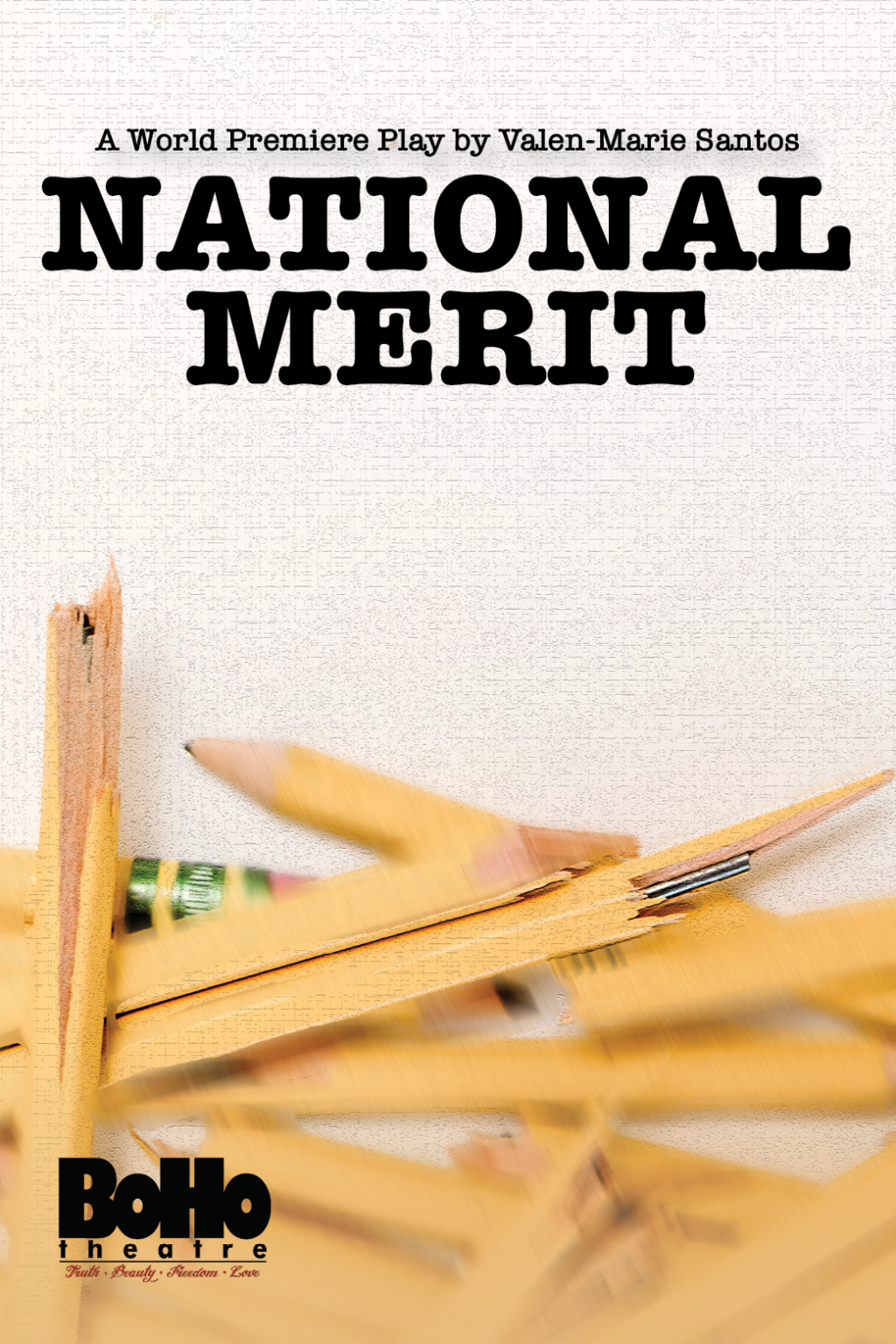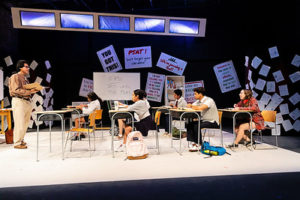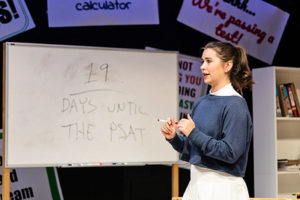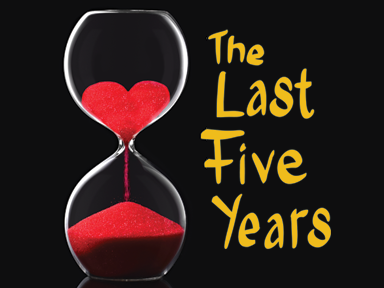
 [rating=3]“National Merit” is a show written by Valen-Marie Santos and directed by Enrico Spada. It tells the story of six high school juniors—Camila (Tatiana Bustamante), Jax (Justin Kuhn), Melissa (Amber Washington), Ariana (Maddie Powell), Cisco (Alex Rocha), and Yash (Sripadh Pulligilla)—who find themselves in a test preparation course at Westbrook High School. Alex (Juan Gonzalez Machain) is the instructor who works for the Mars Test Prep Service and runs the intensive class. His assistant is another high school student, senior mentor Jenny (Magdalena Dalzell). Under the watchful eye of company owner Mr. Mars (whose portrait is prominently displayed on a poster), we see the students prepare for the PSAT by learning test-taking strategies via exercises in the coursebook and repeated practice exams. If they score well, they might wind up as National Merit Scholars, a prestigious designation which could only enhance their opportunity to be admitted to a selective college or university. The theory, of course, is that attending a more prestigious institution of higher learning should improve a student’s prospects to attain a career, gain meaningful employment and higher income, and move up the social ladder in accordance with the American Dream.
[rating=3]“National Merit” is a show written by Valen-Marie Santos and directed by Enrico Spada. It tells the story of six high school juniors—Camila (Tatiana Bustamante), Jax (Justin Kuhn), Melissa (Amber Washington), Ariana (Maddie Powell), Cisco (Alex Rocha), and Yash (Sripadh Pulligilla)—who find themselves in a test preparation course at Westbrook High School. Alex (Juan Gonzalez Machain) is the instructor who works for the Mars Test Prep Service and runs the intensive class. His assistant is another high school student, senior mentor Jenny (Magdalena Dalzell). Under the watchful eye of company owner Mr. Mars (whose portrait is prominently displayed on a poster), we see the students prepare for the PSAT by learning test-taking strategies via exercises in the coursebook and repeated practice exams. If they score well, they might wind up as National Merit Scholars, a prestigious designation which could only enhance their opportunity to be admitted to a selective college or university. The theory, of course, is that attending a more prestigious institution of higher learning should improve a student’s prospects to attain a career, gain meaningful employment and higher income, and move up the social ladder in accordance with the American Dream.
This is a play with a very good premise that raises critical issues about higher education in the United States today, more specially dealing with admission to colleges and universities and how test preparation companies have played a major role in the process. Not only have these companies sold the validity of their services to the parents directly but also to the high schools. While the point of taking the preparation course is supposed to help students to become faster and more proficient at taking standardized tests, the larger question is at what cost? Enrolling in these courses costs money, but they also cost the students time that they might have otherwise spent doing something else, like furthering their talent in art, music, or drama, for example. Certainly, the various institutions of higher education would argue that their undergraduate admissions officers try to look at the “whole student” and that a score on a standardized test is only one portion that makes up a student’s application file. However, in this production, we see how the test preparation industry has carved a financial niche for itself by implying that what a student has achieved to date is a good measure of the potential of what they could achieve in the future, which (as we all know by experience) is certainly not the case. It doesn’t take into consideration such factors as emotional maturity and perseverance (or lack thereof) as well as a wealth of other abilities that the test cannot measure, such as critical thinking or leadership skills, which could also be predictors of future success.
One thing I really liked about the show is that it has a great (chronological) engine for moving the story along, having to do with the successive dates when everyone gets closer to the taking of the actual PSAT. The best part, however, is that each of the characters are authentic in their own way, and their actions are based on the realities that high school students often have to face. Of course, we watch the anxiety involved with taking tests as well the stresses inherent to being a student in a competitive high school environment. But there are other pressures on students too: such as having to deal with family, figuring out one’s sexual orientation, learning how to get along with peers, and trying to create a decent social life. Some of the most convincing and excellent parts of the show highlight interactions regarding ethnic and cultural differences as well as perceived and actual racism among the students. I liked the way that Melissa and Yash both express how Jax makes them feel second-class, but Jax may not even be conscious of this. We see sexism in the professional relationship between Alex and Jenny, as well as how Alex, over time, notices the humanness of the young people he teaches: They are not just names and bodies in his class. But he is shut down by his boss, whose priority is the students’ test scores. After all, the Mars Test Prep company is selling their services to the school, and the bottom line has to do with results. By raising student test scores, the company is assured of profits and a future income stream.
Due to a series of subplots, plenty of tension is created among the various characters to hold our interest so that we want to see how things evolve. But some subplots start out interesting—and there’s nothing wrong with them—but they don’t really go anywhere. I wasn’t sure how I felt about Ariana’s talk about death in this play. She certainly had a very real situation, but this subplot and several others make the story a bit too disjointed. We also come to understand something about homophobia in the course of this show. There is some validity to the subplot about Cisco wanting to be student council president, but I felt this segment was weak and could have been much better. Something is missing in the way he campaigns for office. He mostly wants to hang a poster of himself in the classroom, although to my mind, he should have been handing out buttons or leaflets or chatting more with the others or even passing out treats. What I found interesting, however, is when Cisco says that his father could finally relate to him in a positive way by prematurely addressing him as “El Presidente.”
The staging prominently features a classroom set, decorated in a logical yet whimsical fashion, thanks to Shayna Patel’s set design and Noah Elman’s prop design. Costume design by Liliana Otero seems appropriate to today’s high school men and women. Above all, there is a certain honesty in Henry Muller’s lighting that is especially wonderful, as flickering lights give us some indication of the stress that the students are under. The change in color temperature from the cold classroom lighting to warm lighting provides some allusion to living in a daydream or dreamworld, independent of the high school curriculum, such that students can think about other aspects of their lives separate and apart from the classroom. Throughout, we see characters sit by themselves with the spotlights on them as they indicate how they would like to escape their immediate situation.
Perhaps the biggest problem I had with the story is that the playwright didn’t know how to end it. While, to my mind, the very last scene is a cop-out, the bottom line is that, as a whole, this a well-done depiction having to do with the legitimacy of standardized tests for college entrance. What do these tests really measure? Knowledge? Achievement? The likelihood for success in college (or so the test preparation industry would have us believe)? Or something else, like family background or some form of cultural, ethnic, or class bias? Do we really know the answer? But, as we see here by watching this performance, scoring well on the PSAT most certainly does not measure merit. We observe this when the instructor becomes upset with the class and refuses to teach them any more test-taking skills, and it becomes apparent that the students suffer in the end. “We didn’t get to the section on parabolas, and there were a lot of parabolas on the test,” one student laments after taking the actual PSAT. Of course, I found myself asking: “Is the student who didn’t master parabolas today any more or less qualified to go to college as compared to the student who mastered parabolas just a few days prior?”
As one of the characters points out, the test won’t matter thirty years from now when you are working a job. Another character states that many colleges and universities nowadays, such as Harvard, are getting rid of testing requirements for college entrance: not only the PSAT but also the ACT and the SAT. The consequence is that this component part of the U.S. educational system may turn out to be not be so important after all, and in the near future, standardized testing may become one less thing for students to stress about.
“National Merit”, produced by BoHo Theatre, is running through September 25, 2022, at the Theatre Wit, 1229 W. Belmont, in Chicago.
General admission tickets are $30.
$15 for seniors, military, and first responders.
$10 for students.
Performance schedule:
 Thursdays, Fridays, and Saturdays – 7:30 p.m.
Thursdays, Fridays, and Saturdays – 7:30 p.m.
Sundays – 3:00 p.m.
Additional performances:
Saturday, September 3 – 3:00 p.m.
Monday, September 12 – 7:30 p.m.
Saturday, September 17 – 3:00 p.m.
Wednesday, September 21 – 7:30 p.m.
To purchase tickets: go to https://theaterwit.org/tickets/productions/456/performances#top
or though the Theatre Wit box office 773-975-8150.
For more information about this and other offerings, visit www.bohotheatre.com/our-shows.
Note that COVID restrictions are still in effect. You will be required to show a proof of vaccination card and an ID, and a mask covering your nose and mouth must be worn indoors. Requirements are subject to change at any time.
To see what others are saying, visit www.theatreinchicago.com, go to Review Round-Up and click at “National Merit”






More Stories
“The Last Five Years” MILWAUKEE
“The Trial of Themistocles” reviewed by Julia W. Rath
“Titanique”